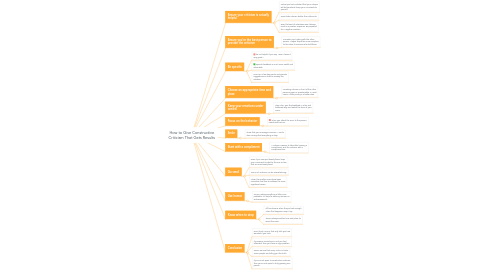How to Give Constructive Criticism That Gets Results
by Danny Forest

1. Ensure your criticism is actually helpful
1.1. Unless you feel confident that your critique will be beneficial, keep your comments to yourself.
1.2. Some take criticism better than others do.
1.3. Even the best of intentions won’t always result in a positive response. Be prepared for a negative reaction.
2. Ensure you’re the best person to provide the criticism
2.1. Consider your history with the other person. Maybe they’d be more receptive to the ideas if someone else told them.
3. Be specific
3.1. It’s not helpful if you say, “Gee, it wasn’t very good.”
3.2. Specific feedback is much more useful and actionable.
3.3. Focus on a few key points and provide suggestions on how to remedy the situation.
4. Choose an appropriate time and place
4.1. Providing criticism in front of the other person’s peers is questionable. In most cases, a little privacy is a better idea.
5. Keep your emotions under control
5.1. Stay calm, give the feedback in a fair and balanced way, and watch the tone of your voice.
6. Focus on the behavior
6.1. When you attach the error to the person, resentment occurs.
7. Smile
7.1. Show that your message is sincere. A smile also conveys that everything is okay.
8. Start with a compliment
8.1. A critique is easier to take after hearing a compliment. End the criticism with a compliment too.
9. Go small
9.1. Even if you can spot twenty flaws, keep your comments limited to the one or two that are most easily fixed.
9.2. Too much criticism can be overwhelming.
9.3. When the smaller errors have been corrected, feel free to address the more significant issues.
10. Use humor
10.1. Humor makes everything a little more palatable. It’ll help to ease any tension or embarrassment.
11. Know when to stop
11.1. It’ll be obvious when they’ve had enough. When that happens, wrap it up.
11.2. There’s always another time and place to revisit the issue.
12. Conclusion
12.1. Don’t trust a mirror that only tells you how wonderful you look.
12.2. If someone corrects you, and you feel offended, then you have an ego problem.
12.3. Never assume that every critic is a hater. Some people are telling you the truth.
12.4. If you’re not open to constructive criticism, then you’re not open to truly growing as a person.


